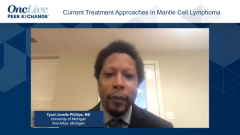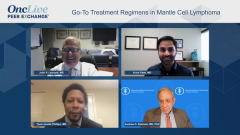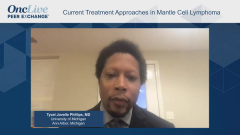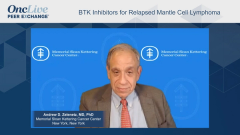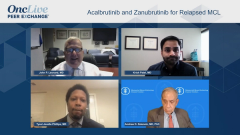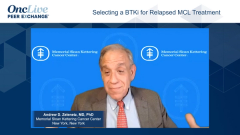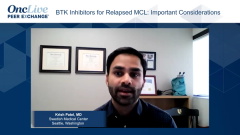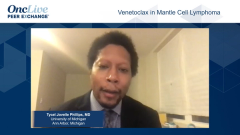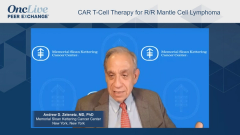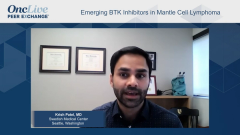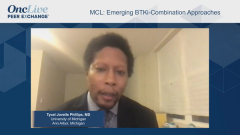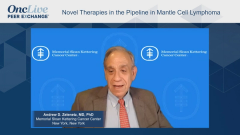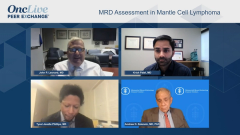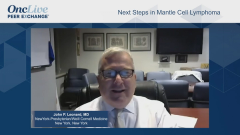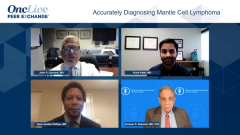
Next Steps in Mantle Cell Lymphoma
Episodes in this series

John P. Leonard, MD: Before we wrap up, I’m going to ask Krish, and then Tycel, and then Andy: Where do you think things are going in the future for mantle cell lymphoma. How will we be treating patients in 5 years? Will we still be giving chemotherapy? Will we still be doing transplants? Will everybody get a CAR [chimeric antigen receptor] T cell? Will they get bispecifics with a BTK [Bruton tyrosine kinase] inhibitor? Krish, pull out your crystal ball, and tell us what you think.
Krish Patel, MD: To borrow from what’s been said before, mantle cell is becoming CLL [chronic lymphocytic leukemia]–like. In some ways, we can imagine that perhaps with these novel agents and combinations of novel agents in all the patient types we described, perhaps we will have a chemotherapy-free initial therapy—combinations of perhaps BTK inhibitors, BCL22 inhibitors, what have you.
Just like in CLL, the role of transplants in particular, allotransplants, becomes exceedingly smaller with novel and more refined immunotherapies. Then certainly there is the question about autologous transplant in the frontline setting for fit patients. We’re all hoping to learn something from the MRD [minimal residual disease] story there to more carefully select patients for that therapy. I think mantle cell lymphoma is very much following the path of CLL. In 5 years perhaps we will have less chemotherapy.
John P. Leonard, MD: Tycel, your thoughts?
Tycel Jovelle Phillips, MD: I completely agree. Think that’s where the field is heading at this point. As far as transplant, we’re trying to move away from that. Specifically for a certain patient population, especially if the CAR T data continue to play out, CAR T will probably move up front for these highly aggressive TP53-mutated patients unless we find some other treatments that give us similar outcomes with less toxicity.
John P. Leonard, MD: Andy, your thoughts?
Andrew D. Zelenetz, MD, PhD: I agree that we’re going to move away from conventional cytotoxic chemotherapy. Remember these targeted therapies are not adverse-effect-free. When you say chemotherapy-free, people think adverse-effect-free; that’s not the case. But the important thing is that we have to build combinations that allow for time-limited therapy because quality of life is really impacted by having to give therapy forever. If we can get high-quality remissions, particularly MRD undetectable, with combinations and a time-limited fashion, that’s going to be helpful.
I agree that we’re probably going to see CAR T cells move up because if we’re using the novel agents combined in the first line, they may not work a second time. If we give them in a time-limited way, it’s possible that we can actually re-treat patients. That’s another thing we need to ask. The goal is, I would love to say, “Oh, we’re going to cure mantle cell lymphoma.” But I would be perfectly happy to turn it into follicular lymphoma and have people live their age-matched, sex-matched expected life span. If we can do that and they’re dying of things other than their lymphoma, that’s OK. I’ll leave it to the next generation to cure the disease. I just want them to live their normal life span.
John P. Leonard, MD: My analogy for follicular and for many patients with mantle cell is that it’s a hitchhiker, and we want them to make their destination. Sometimes it will be in the trunk of a car, sometimes the back seat. We want to keep it out of the front seat grabbing the steering wheel and playing with the radio. We don’t want to crash the car either, so the more things we have in our armamentarium to hold that trunk of the car down is a good thing. It sounds as if, from what we’ve talked about, there are lots of new opportunities and agents on the horizon, as well as some pretty good things in our bag of tricks right now and lots of work going on. There is reason for optimism.
I really want to thank my coconspirators today, my copanelists for this great discussion: Dr Krish Patel, Dr Tycel Phillips, and Dr Andy Zelenetz. It’s been a lot of fun to hear your perspectives and talk about some of the new things out there. I want to thank you again, our audience. We hope you’ve found this OncLive® Peer Exchange discussion to be useful and informative, and we hope to have the chance in the future to speak with you about other interesting topics.
Transcript Edited for Clarity


